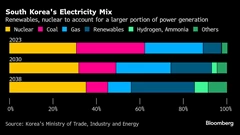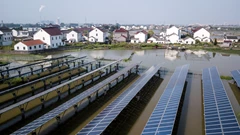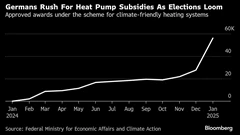Record-Hot 2024 Seen Breaching 1.5C Paris Target for First Time
(Bloomberg) -- This year will be the hottest on record, and the first to exceed the target set at the Paris climate conference in 2015, according to a European Union data service.
The temperature in 2024 will likely be more than 1.55C above the pre-industrial level, the Copernicus Climate Change Service said in a statement on Thursday. The landmark Paris Agreement called for reducing carbon dioxide emissions in the hope of limiting global warming to 2C (3.6F), and ideally 1.5C, above temperatures at the outset of the Industrial Revolution.
The 2C goal is the upper limit scientists have set to keep climate change from hitting an irreversible tipping point, unleashing catastrophic floods, droughts and storms. The 1.5C target is generally seen as being a longer-term average rather than a single year, and climate negotiators have touted the possibility of bringing temperatures back down below the threshold in the event of a breach.
Yet the Copernicus findings add to growing concerns that a more protracted move higher is simply a matter of time, with global CO2 emissions yet to peak. It also comes as Donald Trump’s electoral victory empowers him to deliver on campaign pledges to go after climate policies he’s dubbed the “green new scam.”

A record hot year increases the challenge faced by delegates attending the COP29 climate talks that start next Monday in Baku, Azerbaijan.
“This marks a new milestone in global temperature records and should serve as a catalyst to raise ambition for the upcoming Climate Change Conference, COP29,” said Samantha Burgess, deputy director of Copernicus.
October was 1.65C warmer than pre-industrial levels, the 15th month in 16 that temperatures have exceeded that threshold. Based on national climate plans, temperatures are now expected to peak this century at 2.1C to 2.8C above that level, new UN analysis shows.
Temperatures in October were above average for most of Europe. During the month, the continent experienced extreme rainfall, leading to flash flooding in Spain’s Valencia region, where more than 200 people died.
©2024 Bloomberg L.P.
KEEPING THE ENERGY INDUSTRY CONNECTED
Subscribe to our newsletter and get the best of Energy Connects directly to your inbox each week.
By subscribing, you agree to the processing of your personal data by dmg events as described in the Privacy Policy.
More renewables news

GB Energy Faces New Doubts as UK Declines to Affirm Future Funds

Korea Cancels Planned Reactor After Impeaching Pro-Nuke Leader

Brazil’s Net-Zero Transition Will Cost $6 Trillion by 2050, BNEF Says

SolarEdge Climbs 40% as Revenue Beat Prompts Short Covering

EU to Set Aside Funds to Protect Undersea Cables from Sabotage

China Revamps Power Market Rules In Challenge to Renewables Boom

KKR increases stake in Enilive with additional €587.5 million investment

TotalEnergies and Air Liquide partner to develop green hydrogen projects in the Netherlands

Germany Set to Scale Down Climate Ambitions
















